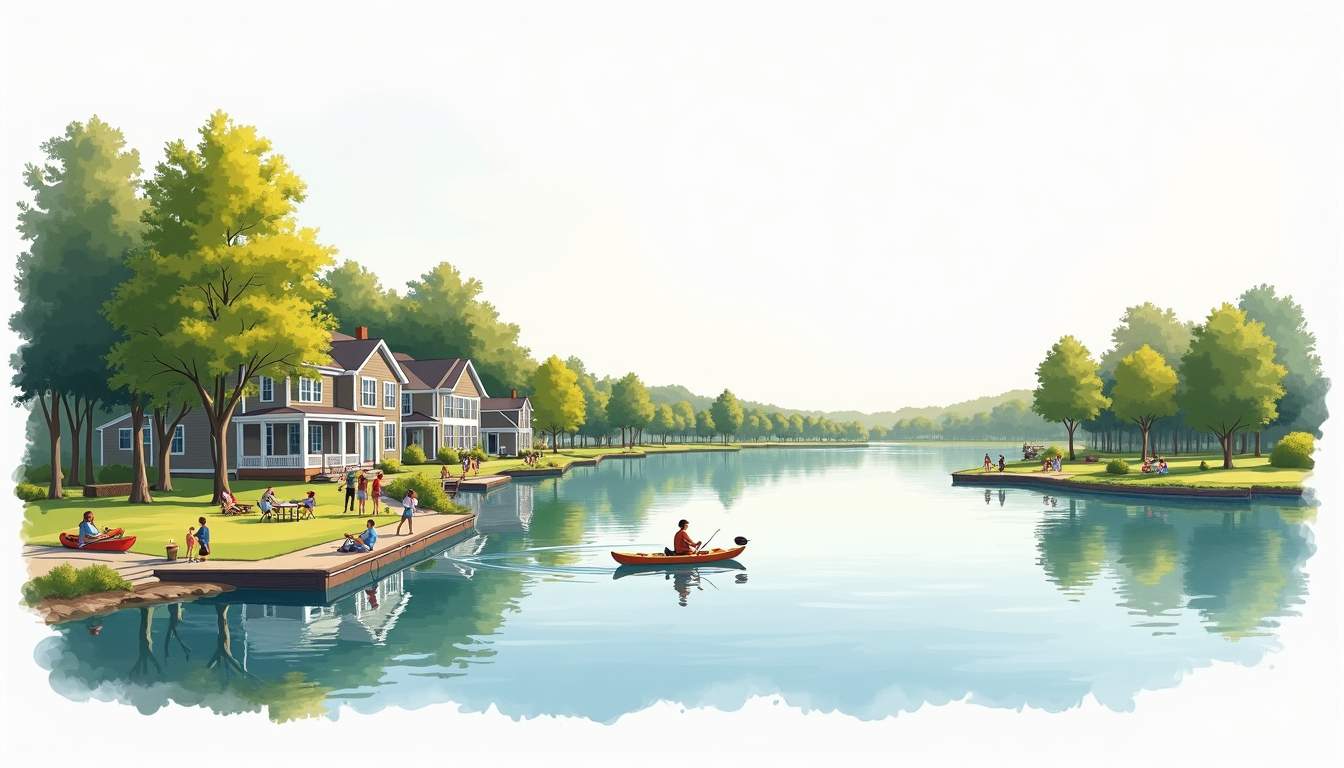
Water view properties in Loudon County offer a blend of scenic character, outdoor recreation, and a lifestyle that appeals to a wide range of buyers. From quiet coves on the Tennessee River to properties overlooking smaller lakes, the local market includes options for weekend retreats, full-time residences, and investment properties for short-term rental markets. This guide walks through the essentials: types of water views, neighborhood pros and cons, practical inspection and insurance considerations, and tips for making a confident purchase.
Not all "water views" are created equal. Knowing the difference between direct waterfront, water access, and distant water views helps set realistic expectations for price, privacy, and maintenance responsibilities. Waterfront properties abut the water and often include riparian rights, while water access properties might share a deeded easement or community dock. Distant water views are typically higher-elevation properties that overlook a body of water but do not touch it.
Views can also change with seasons and water levels. Riverfront lots on the Tennessee River often show fluctuations in shoreline width and vegetation depending on rainfall and upstream management. Lakefront properties on reservoirs may offer more stable shorelines, but seasonal boating traffic and shoreline maintenance still influence the daily experience. Inspect potential properties in different seasons when possible to see how the view and access perform year-round.
Full waterfront ownership usually means the land extends to the water's edge, giving the owner control over docks, seawalls, and shoreline vegetation within local regulations. Riparian rights refer to privileges tied to land that borders water, such as reasonable use of the water and access for recreational purposes. Confirm legal descriptions and any local ordinances that affect shoreline work, because "waterfront" can mean different things in different deeds and jurisdictions.
Private coves provide natural shelter from winds and boat wakes, often making them desirable for small boats and quiet viewing. Shared access lots are less expensive and common in planned communities; they permit waterfront enjoyment without the full maintenance and cost of owning shoreline. Community docks can increase convenience but may bring more traffic and less privacy. Review community rules on dock usage, mooring fees, and maintenance schedules if considering a shared access property.
Loudon County covers a mix of rural, suburban, and small-town settings with notable water features such as the Tennessee River, Fort Loudoun Lake, and smaller tributaries. Neighborhood characteristics vary widely: some areas focus on large lot rural living with expansive views and significant privacy, while others are denser residential communities with shared amenities and easier access to shopping and services.
Consider proximity to employment centers and services as well as commute times. Many buyers prioritize a balance between scenic tranquility and practical access to schools, medical care, and grocery shopping. Certain riverfront neighborhoods near the county seat offer a closer connection to local amenities, while more remote lakeside properties appeal to recreational buyers and weekenders.
Fort Loudoun Lake is a sizable reservoir with varied shoreline, marinas, and public boat ramps. Lakeside properties often command higher prices due to direct access and boating opportunities. Look for properties with private docks or the ability to build one; verify permitting requirements with the Tennessee Valley Authority and local authorities. Lakeside living typically includes a strong recreational community, seasonal boat traffic, and neighborhood events tied to lake life.
The Tennessee River provides long stretches of scenic riverbank, and riverfront properties can offer sweeping views and deeper water for larger boats. These properties sometimes feature bluffs or elevated lots that protect against minor flooding and provide panoramic vistas. However, river dynamics—currents, barge traffic, and varying water levels—can impact both enjoyment and maintenance. Assess navigability and proximity to commercial river traffic when selecting a riverfront lot.
Waterfront properties demand a focused inspection beyond standard home checks. Shoreline stabilization, drainage, dock condition, and flood considerations are critical elements. A thorough due-diligence period should include specialists who understand shoreline engineering, timber condition on riparian lots, and potential erosion issues.

Start with an inspection that covers structural integrity, roofing, and mechanical systems as usual. Then layer in waterfront-specific inspections: evaluate dock foundations, seawalls, bulkheads, and any shoreline rip-rap. Trees and vegetation close to the shoreline need assessment for root stability and potential for storm damage. Having a clear picture of necessary repairs or ongoing maintenance prevents unpleasant surprises after closing.
Even properties that seem high and secure can fall within floodplain boundaries depending on FEMA maps and local flood zones. Obtain elevation certificates when available and review historical flood records for the parcel. Flood insurance may be required by lenders if the home sits in a special flood hazard area, and premiums can vary substantially depending on elevation and mitigation measures.
Many waterfront properties use private wells and septic systems; proximity to the water table affects both performance and regulation. Confirm septic inspection records and well water testing results for contaminants, recreational run-off, and bacterial presence. Also verify utility access—some rural parcels have limited broadband or rely on propane for heating. Plan for potential upgrades if modern conveniences are a priority.
Securing insurance for water view properties requires attention to both standard homeowners policies and specialized coverage for flood, wind, and liability. Flood insurance is often separate from the homeowners policy and can be expensive depending on the property's flood zone. Windstorm coverage may also come with higher premiums in exposed shoreline locations. Comparing quotes and understanding exclusions is an essential step before committing to a purchase.
Permits for docks, seawalls, and significant landscaping near the shoreline are governed by a mix of local, state, and federal agencies. The Tennessee Valley Authority has rules for structures along certain reservoirs; local county permits may require erosion control plans and professional engineering. Budget for permit fees and potential mitigation work if the property needs shoreline stabilization or dock construction.
Shoreline properties often incur higher maintenance costs than inland homes. Docks require seasonal inspections and repairs, sea walls or rip-rap may need reinforcement over time, and lawns near the water face salt spray, algae, and invasive plants. Plan for annual budgets that include dock upkeep, professional landscaping suited to the shoreline, and erosion control measures, particularly after strong storms.
Property taxes can be affected by location and assessed value, but waterfront properties may see higher assessments due to scarcity and demand. Some communities impose special assessments for shared shoreline amenities or community dock maintenance. Review recent tax records and ask about any pending or proposed assessments that could alter ownership costs.
Owning a water view property opens opportunities for boating, fishing, kayaking, birdwatching, and waterside entertaining. Community culture often centers on outdoor recreation and seasonal events, with neighbors who share an interest in lake or river life. That environment can be social and active, but it can also bring noise from boat traffic and gatherings during peak seasons.

Consider daily routines and how water adjacency affects them. Morning walks along the shoreline, evening sunsets, and the presence of wildlife are common draws. At the same time, privacy levels vary—some coves are quiet and secluded, while popular boat channels and public ramps attract weekend visitors and create more activity near the water.
Dock access determines how easy it is to launch a boat and maintain it. Private docks provide convenience, but shared docks reduce the ownership responsibilities. Fishing opportunities differ by body of water—reservoirs and rivers have distinct fish populations and fishing regulations. Verify whether any local restrictions or license requirements apply to recreational activities.
Wildlife encounters are a highlight, from wading birds and waterfowl to deer along the shore. Noise sources include boat engines, community events, and occasional commercial river traffic on larger waterways. Seasonal changes affect water clarity, shoreline vegetation, and insect populations, so factor that annual rhythm into expectations for comfort and maintenance.
Water view properties often carry a price premium, but negotiation room can exist depending on market conditions, property condition, and seller motivation. Engaging a local agent with specific experience in waterfront transactions helps identify comparable sales and realistic value. Because special inspections and permitting questions matter more here, structuring contingencies in the offer is wise.
Time the offer to allow for thorough inspections, survey verification, and permit research. When possible, include contingencies that permit withdrawal or renegotiation if significant shoreline or structural issues are uncovered. Be prepared to act quickly in a competitive market, but avoid waiving essential protections to secure a deal.
Comparables for water view homes should match not just square footage, but the type of view, waterfront access, dock presence, and lot elevation. A house with full private waterfront and a well-built dock often sells for significantly more than a similar-sized home with only a distant water view. Adjust valuations for differences in shoreline quality, maintenance needs, and boat access.
Involve local professionals: a real estate agent familiar with Loudon County waterfronts, an inspector experienced in marine and shoreline issues, and a real estate attorney to review riparian rights and deed language. Their combined expertise reduces the risk of legal surprises and clarifies responsibilities related to shoreline structures and easements.
Before closing, verify that all agreed repairs are completed and obtain receipts or warranties for dock work, seawall repairs, and other shoreline improvements. Confirm that title insurance covers any easements, riparian rights, and access agreements. If buying in a community with shared amenities, review any pending minutes or budgets from homeowners associations that could affect future costs.

Perform a final walk-through at a similar tide or lake level when possible, and inspect dock hardware, mooring lines, and shoreline vegetation. Ensure utilities are functioning and that permits for recent work are properly filed. A well-prepared closing helps transition smoothly into waterfront ownership and reduces immediate post-purchase surprises.
Water view properties in Loudon County offer a unique combination of natural beauty and recreational opportunity, but they also bring specific responsibilities and occasional tradeoffs. Prioritizing the type of view that matches lifestyle goals, conducting targeted inspections, and planning for long-term maintenance and insurance costs will help ensure a successful purchase.
With careful preparation and local expertise, a water view property can provide years of enjoyment and strong resale potential. Approach the search with a clear list of priorities, an eye toward seasonal changes, and a readiness to navigate waterfront-specific rules and maintenance needs.
Elevate your water view property experience by exploring Tennessee National, a premier gated community that combines stunning natural beauty with luxury living. Enjoy exclusive access to a Greg Norman Signature Golf Course, a private marina, waterfront dining, and over 20 exceptional amenities designed for your lifestyle. Whether you seek a move-in ready home or a custom build, Tennessee National offers scenic waterfront living with vibrant social clubs and nature trails. Schedule a private tour today and start making memories daily in this breathtaking lakeside community.